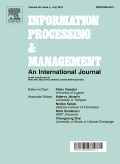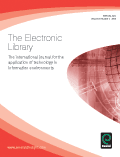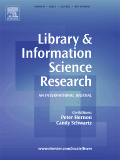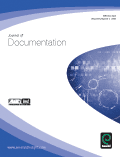
Biblios-Revista de Bibliotecologia y Ciencias de la Informacion
Scope & Guideline
Connecting Scholars to the Evolving Landscape of Information Management
Introduction
Aims and Scopes
- Library and Information Science Research:
The journal publishes studies that explore various dimensions of library and information science, including management, technology integration, and user behavior. - Information Literacy and Empowerment:
A significant focus is on information literacy, especially how it empowers different demographics, such as rural women and marginalized communities. - Data Management and Accessibility:
Research on data management practices, open data, and the sustainability of institutional repositories is a core area, reflecting the growing importance of data in research and libraries. - Technological Innovations in Libraries:
The journal highlights the impact of technology on library services, including the use of IoT applications and automated tools for information retrieval. - Cultural and Social Aspects of Information:
It also addresses the intersection of culture, gender, and information science, emphasizing decolonial studies and the role of libraries in social justice. - Disaster Management in Libraries:
The journal discusses the preparedness of libraries for disasters, emphasizing the need for effective management strategies.
Trending and Emerging
- User-Centered Research:
A growing number of studies focus on understanding user behavior and needs, emphasizing the importance of user-centered approaches in library services and information management. - Open Science and Data Sharing:
There is an increasing emphasis on open science practices and data sharing, particularly in relation to institutional repositories and the management of research data. - Impact of Technology on Libraries:
Research examining the impact of emerging technologies, such as IoT and automated tools for information retrieval, is on the rise, indicating a shift toward modernizing library services. - Social Justice and Information Access:
A marked trend towards exploring social justice issues, including informational vulnerability and empowerment through information literacy, reflects a commitment to addressing inequality in access to information. - Interdisciplinary Approaches:
The journal is witnessing a trend towards interdisciplinary research that integrates concepts from various fields, such as gender studies, cultural studies, and information science, fostering a more holistic understanding of information issues.
Declining or Waning
- Traditional Cataloging Practices:
As libraries increasingly adopt digital technologies, traditional cataloging practices have become less prominent in recent publications, indicating a shift towards more innovative information management approaches. - Static Library Services:
Research centered on conventional library services has decreased, reflecting a trend toward exploring dynamic and technology-driven library environments. - Historical Analysis of Information Science:
There has been a noticeable decline in the emphasis on historical perspectives in information science research, as current studies tend to focus more on contemporary issues and future trends. - Local or Regional Library Studies:
While still relevant, there has been a reduction in studies focusing solely on local or regional libraries, possibly due to a growing interest in global perspectives and comparisons.
Similar Journals

INFORMATION PROCESSING & MANAGEMENT
Unveiling Cutting-edge Research in Information TechnologyINFORMATION PROCESSING & MANAGEMENT, published by ELSEVIER SCI LTD, is a distinguished journal at the forefront of research in the fields of Computer Science, Information Systems, Library and Information Sciences, and Management Science and Operations Research. Since its inception in 1975, this journal has continually evolved to provide a scholarly platform for the dissemination of innovative methodologies and frameworks in information processing. With a remarkable Q1 ranking across multiple disciplines and esteemed Scopus rankings—notably, 1st in Media Technology and 4th in Library and Information Sciences—it stands as a pivotal resource for researchers, professionals, and students alike, seeking to advance their understanding and application of information management principles. Although not an Open Access journal, it remains widely accessed and respected, marking its influence in shaping the future of effective information management practices. The journal is committed to providing a rigorous peer-review process, ensuring the publication of high-quality research that addresses current challenges and trends in information technology and its application in various sectors.

Investigacion Bibliotecologica
Empowering Knowledge Sharing in Library and Information SciencesInvestigacion Bibliotecologica, published by the National Autonomous University of Mexico, stands as a vital resource in the field of library and information sciences. With a legacy of open access publishing since 1986, this journal endeavors to disseminate high-quality research which aims to advance knowledge and practices within the library and information sector. With an ISSN of 0187-358X and E-ISSN 2448-8321, it has secured its position in the competitive landscape of scholarly communication, earning a commendable Q3 ranking in its category as of 2023. The journal's influence is reflected in its Scopus ranking within the library and information sciences field, where it ranks #151 among 280 journals. Located in Mexico City, it provides scholars, professionals, and students with open access to its content, facilitating knowledge sharing and academic collaboration. As it continues its publication journey from 2008 to 2024, Investigacion Bibliotecologica remains an essential platform for innovative inquiries, practical insights, and the latest developments in library science.

ELECTRONIC LIBRARY
Showcasing Pioneering Studies in Library ScienceELECTRONIC LIBRARY, published by EMERALD GROUP PUBLISHING LTD, serves as a pivotal resource in the realms of Library and Information Sciences as well as Computer Science Applications. Established in 1983 and continuing through 2024, this journal showcases critical research and developments that shape modern information practices and the utilization of electronic resources. With a respectable impact factor positioning it in the Q2 quartile for Library and Information Sciences and Q3 for Computer Science Applications, the journal ranks #57 out of 280 in its field, reflecting its significance within the scholarly community. Authors are encouraged to contribute innovative studies that engage with current challenges and technological advancements, ensuring that the ELECTRONIC LIBRARY remains at the forefront of academic discourse. While the journal does not currently offer open access options, it remains an essential subscription-based resource for researchers, professionals, and students seeking to deepen their understanding of digital libraries and information management.

LIBRARY AND INFORMATION SCIENCE
Navigating the future of information sciences together.LIBRARY AND INFORMATION SCIENCE is a specialized academic journal dedicated to the advancement of knowledge and scholarship in the field of library and information sciences. Published by MITA SOC LIBRARY INFORMATION SCIENCE, this esteemed journal has been a crucial platform for scholarly communication since 1980, addressing the dynamic challenges and developments in the information landscape. Although it holds a Q4 category ranking in the Library and Information Sciences according to the 2023 Scopus Ranking, the journal serves a unique niche, providing insights and fostering discussions among a diverse audience of researchers, professionals, and students. With no Open Access options currently available, its valuable research contributions are accessible through institutional subscriptions and library access. The journal aims to disseminate innovative research, case studies, and theoretical explorations that enhance our understanding of information behavior, retrieval systems, library management, and emerging technologies, thus promoting an informed society in an increasingly digital world. Given its focused scope and enduring presence, LIBRARY AND INFORMATION SCIENCE continues to be an essential resource for anyone invested in the future of libraries and information services.

CANADIAN JOURNAL OF INFORMATION AND LIBRARY SCIENCE-REVUE CANADIENNE DES SCIENCES DE L INFORMATION ET DE BIBLIOTHECONOMIE
Innovating library practices for a digital age.Canadian Journal of Information and Library Science - Revue Canadienne des Sciences de l'Information et de Bibliothéconomie is a notable peer-reviewed journal dedicated to the fields of information science and library studies, published by Western Libraries. Since its inception in 1993, this journal has served as a crucial platform for disseminating high-quality research and insights into library practices, information management, and the evolving roles of information professionals. With an impact factor that reflects its standing within the academic community, it currently holds Q4 status in Information Systems and Q3 in Library and Information Sciences for 2023, indicating a growing influence in its fields. Although the journal operates without Open Access options, it remains accessible to those affiliated with institutions that support its research mission. Scholars, practitioners, and students alike are encouraged to engage with the rich content provided in this journal, which sits within the Social Sciences and Computer Science domains, making it an essential resource for advancing scholarly discourse and practical applications in the continuously evolving landscape of information and library science.

Annals of Library and Information Studies
Unlocking the Future of Information StudiesAnnals of Library and Information Studies is a prominent open-access journal, published by NATL INST SCIENCE COMMUNICATION-NISCAIR in India, dedicated to advancing research in the fields of library science and information studies. With an ISSN of 0972-5423 and an E-ISSN of 0975-2404, this journal ensures broad accessibility, having embraced open access since 2009, facilitating the dissemination of knowledge to a diverse global audience. The journal features a comprehensive range of scholarly articles that explore innovative practices, emerging technologies, and significant trends influencing library and information science, which are crucial for professionals, researchers, and students alike. Additionally, it holds a respectable ranking in Scopus, positioned at the 54th percentile in Library and Information Sciences and 22nd percentile in Computer Science Applications, underscoring its relevance and impact within these disciplines. The Converged Years of 2011 to 2024 illustrate a commitment to publishing contemporary research. As the realm of information continues to evolve rapidly, the Annals of Library and Information Studies serves as an essential platform for fostering dialogue and knowledge exchange, solidifying its role as a vital resource for the academic community.

LIBRARY & INFORMATION SCIENCE RESEARCH
Shaping the landscape of library research.LIBRARY & INFORMATION SCIENCE RESEARCH is a premier academic journal dedicated to advancing the field of library and information sciences. Published by Elsevier Science Inc, this journal has established its reputation for rigorous research and impactful scholarship since its inception in 1987. With an impressive Q1 ranking in Library and Information Sciences and a Q2 ranking in Information Systems for 2023, it reflects the growing importance of library sciences in an increasingly digital world. The journal serves as an essential platform for researchers, professionals, and students, offering insightful articles that address emerging trends and challenges in the realm of information dissemination and management. Although not an open-access journal, its contributions are widely recognized, as evidenced by its strong Scopus rankings, with a position of #53 out of 280 in Library and Information Sciences. If you are looking to deepen your understanding of the dynamic interplay between libraries, technology, and information systems, LIBRARY & INFORMATION SCIENCE RESEARCH is an indispensable resource in your academic journey.

Perspectivas em Ciencia da Informacao
Innovating insights for the future of information science.Perspectivas em Ciencia da Informacao is a premier academic journal published by Universidade Federal de Minas Gerais, specifically from the Escola de Biblioteconomia. Since its inception in 2006, this Open Access journal has become a vibrant platform for disseminating research in the fields of Library and Information Sciences, Information Systems, Communication, and Museology. With a reputation bolstered by its classification in multiple quartiles—ranging from Q2 to Q4 in 2023—this journal stands out in the Brazilian academic landscape, providing valuable insights and supporting knowledge development for researchers, professionals, and students alike. Its impact is further underscored by its inclusion in Scopus, where it ranks within the lower percentiles of its categories, highlighting its potential for growth and increasing relevance in the scholarly community. The journal aims to explore emerging trends and significant issues in information science, facilitating an essential dialogue among scholars and practitioners to propel the field forward.

JOURNAL OF DOCUMENTATION
Transforming Knowledge into Practice in Information Systems.JOURNAL OF DOCUMENTATION is a premier academic journal published by Emerald Group Publishing Ltd, dedicated to advancing knowledge in the fields of Information Systems and Library and Information Sciences. With an enduring legacy since its inception in 1945, this journal has established itself as a pivotal resource for researchers, professionals, and students alike, providing cutting-edge insights and comprehensive research findings relevant to the ever-evolving landscape of information management. The journal boasts a commendable impact factor and has been ranked in the Q2 category for Information Systems and Q1 for Library and Information Sciences as of 2023, reflecting its significant contribution to these fields. It is indexed in Scopus, with notable rankings in the Social Sciences and Computer Science categories, ensuring visibility and accessibility for the academic community. While the journal currently does not offer open access, it remains committed to disseminating high-quality research that informs practice and stimulates scholarly discussion locally and globally, making it a valuable asset for anyone invested in the study of documentation and information processes.

African Journal of Library Archives and Information Science
Navigating the Future of Library Science in Africa.The African Journal of Library Archives and Information Science (ISSN: 0795-4778; E-ISSN: 0795-4778) is a pivotal publication in the field of Library and Information Sciences, published by ARCHLIB & INFORMATION SERVICES LTD in Nigeria. With a focus on the diverse and evolving challenges faced by libraries and information professionals in the African context, this journal serves as a platform for scholarly communication, fostering innovation and collaboration among researchers, practitioners, and academics. The journal has a notable impact factor, reflected in its Q3 ranking within the category for 2023, and is indexed in Scopus, holding a percentile rank of 22nd in its field, further validating its relevance and scholarly contribution. Running since 2008 with continual publications through to 2024, the journal aims to advance knowledge, share best practices, and highlight emerging trends in librarianship and information science across Africa and beyond. By offering open access options, it ensures wide dissemination of knowledge, making it an essential resource for those dedicated to enhancing information services and archives.